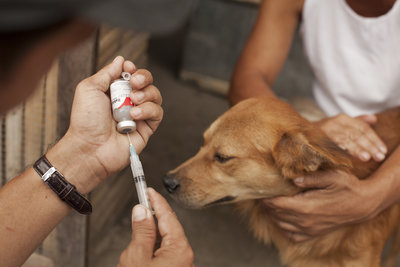
This World Rabies Day puts a spotlight on the rabies situation in the Yolanda affected areas. The World Health Organization together with the Philippine Department of Health and the Department of Agriculture is conducting rabies vaccination of household pets in areas affected by typhoon Yolanda. Canine rabies potentially threatens over 3 billion people in Asia and Africa.
Dogs are the main hosts and transmitters of rabies and are the source of infection in all of the estimated 50 000 human rabies deaths annually in Asia and Africa. Since 2009, the Bill and Melinda Gates Foundation has been supporting the WHO to implement with the Philippine government the vaccination of dogs in the Visayas region. This, however, was disrupted at the onset of typhoon Yolanda causing higher incidences of animal bites and displaced dogs.
Rabies is a disease brought about by a virus and can be transmitted to humans from animals. The incubation period for rabies can range from less than a week to more than a year, making immediate detection unpredictable and difficult. The initial symptoms of rabies are fever and often pain or an unusual tingling, pricking or burning sensation (paraesthesia) at the wound site. As the virus spreads through the central nervous system, progressive, fatal inflammation of the brain and spinal cord develops.
Although effective treatment soon after exposure to rabies can prevent the onset of symptoms and death, human vaccines and immunoglobulin are not readily available especially in rural areas where there is a higher risk of contracting rabies. The most cost-effective strategy for preventing rabies in people is by eliminating rabies in dogs through vaccination.
The main strategy of the Rabies free Visayas project involves the prevention of human rabies through the control and eventual elimination of canine rabies. The partnership involved in the elimination of canine rabies involves the Philippine Department of Health, Department of Agriculture, Local Government Units and the World Health Organization. Dogs are currently being vaccinated with the support of the Bill and Melinda Gates Foundation and other donors funding WHO’s work in the Yolanda affected areas.
